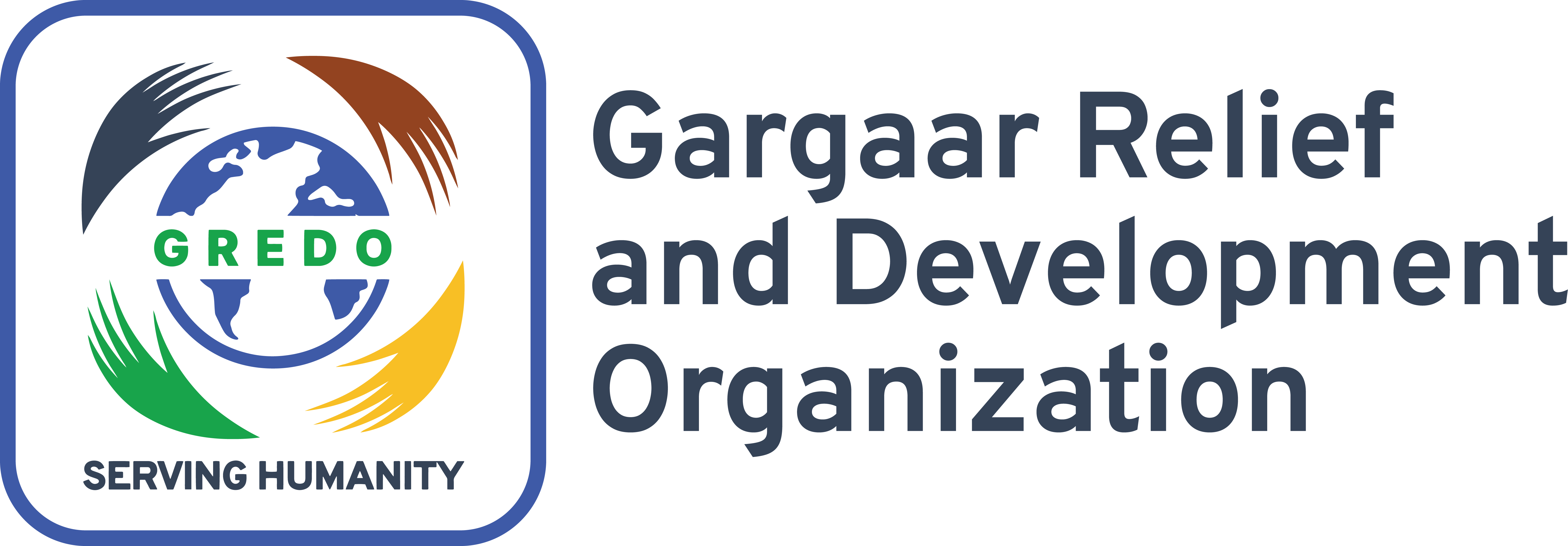“Before, I didn’t know that measuring my child’s arm could save his life. GREDO taught me how to do it myself. Now I check my children every week and share this with other mothers.”
— Habibo Bishaar Hassan
In the dusty displacement camps of Kurman village, Bardhere district, 33-year-old Habibo Bishaar Hassan faced the unimaginable. Her youngest son, Farhan Ali Ibrahim only two years old was severely malnourished. His Mid-Upper Arm Circumference (MUAC) measured just 10.9 cm, a stark indication of life-threatening acute malnutrition.
Habibo had fled violence in Dinsor four years earlier after the death of her husband, arriving in Kurman with nothing but her seven children. Struggling to survive without a livelihood, shelter, or access to basic services, she watched helplessly as Farhan’s condition deteriorated. He became increasingly weak, stopped eating, and lost the energy even to cry or play.
Everything changed when GREDO’s Community Nutrition Volunteers (CNVs), during routine door-to-door visits, identified Farhan’s condition and referred him to the nearest Outpatient Therapeutic Program (OTP) supported under the Jubaland Health and Nutrition Project (JHNP).
Through the support of GREDO and CARE, Farhan was immediately enrolled in treatment for Severe Acute Malnutrition (SAM). He began receiving weekly rations of Ready-to-Use Therapeutic Food (RUTF) and consistent medical follow-ups. His mother, Habibo, received care too she joined a Maternal, Infant, and Young Child Nutrition (MIYCN) support group, underwent Family MUAC training, and received psychosocial counselling to help her cope with the trauma of displacement and loss.
Over the next eight weeks, Farhan’s health steadily improved. By the time he was discharged, his MUAC had increased to 12.6 cm a sign of full recovery. He could smile, laugh, and play again. More than just surviving, Habibo had found purpose. She now uses her experience to educate other mothers on recognizing early signs of malnutrition and accessing life-saving care.
“I thought I was going to lose Farhan. He had stopped eating, and I didn’t know what to do. When the GREDO health workers came and screened him, they gave me hope. I will never forget their kindness.”— Habibo Bishaar Hassan, mother of Farhan
Comprehensive Support Beyond Nutrition
Upon identification by GREDO-trained health workers during a community MUAC screening, Farhan was quickly enrolled in the OTP program. In addition to RUTF and medical supervision, GREDO’s integrated response addressed other health concerns, including respiratory infections and diarrheal diseases, which frequently worsen malnutrition.
The support didn’t stop there. Habibo participated in MIYCN group sessions that covered child feeding practices, hygiene, and meal preparation using locally available resources. She also benefited from Family MUAC training, empowering her to regularly monitor all her children’s nutrition status.
Furthermore, recognizing the mental and emotional strain faced by displaced mothers, the project offered protection and psychosocial support services. Habibo received emotional counselling and was referred to protection services when needed restoring her confidence as a mother and caregiver.
A Voice of Change in the Community
Habibo’s transformation from a vulnerable mother to a community advocate is a powerful testament to the project’s impact. She now mentors other women in the camp, sharing what she has learned and encouraging early action.
“Before, I didn’t know that measuring my child’s arm could save his life. GREDO taught me how to do it myself. Now I check my children every week and share this with other mothers.”
— Habibo Bishaar Hassan
GREDO’s CNV, Mohamed, recalled:
“When we first met Habibo, she looked worn out and hopeless. Her baby was quiet not even crying. That silence is always the scariest sign. We acted fast and followed up every week.”
Nutrition Nurse Sadia Abdi added:
“Farhan’s recovery was remarkable. His mother’s dedication made all the difference. She never missed a follow-up.”
Halima, a MIYCN counselor and midwife, shared:
“Habibo became one of the most engaged participants in our sessions. She’s now a trusted voice among other mothers.”
Community leader Osman emphasized the broader impact:
“This is not just about one child. Every time a child like Farhan recovers, the whole camp feels hope again.”
Project Background
The Jubaland Health and Nutrition Project (JHNP) is a joint humanitarian initiative implemented by GREDO in partnership with CARE and with financial support from CARE Luxembourg and MOFA Luxembourg. Running from July 2024 to May 2025, the project targets 57,400 vulnerable individuals across Bardhere and Luq districts, focusing on children under five, pregnant and lactating women, and displaced or crisis-affected communities.
JHNP delivers integrated health, nutrition, and protection services, including:
- Screening and treatment of SAM/MAM cases
- Primary and reproductive healthcare
- Infant and Young Child Feeding (IYCF) counselling
- Psychosocial support and protection referrals
- Family MUAC and MIYCN education
- Community-based health outreach
All interventions align with Somalia’s Essential Package of Health Services (EPHS) and IMAM guidelines, ensuring quality and sustainability.
Habibo’s journey from grief and fear to empowerment and advocacy is a moving example of how integrated humanitarian assistance can restore not only health but dignity. Her son Farhan’s survival is a symbol of hope for her family and the wider community.
“We were lost after we fled Dinsor. The drought, the fighting left us with nothing. But GREDO and CARE stood by us in the darkest time. They didn’t just treat Farhan; they helped our whole family recover.”
— Habibo Bishaar Hassan




